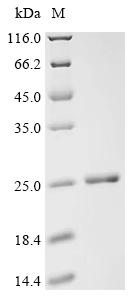Recombinant Qbeta virus Capsid protein
CAT:
399-CSB-EP886842ELC-03
Size:
1 mg
Price:
Ask
- Availability: 24/48H Stock Items & 2 to 6 Weeks non Stock Items.
- Dry Ice Shipment: No




Recombinant Qbeta virus Capsid protein
- CAS Number: 9000-83-3
- UniProt: Q9T0R9
- Expression Region: 2-133aa
- Organism: Qbeta virus (strain MX1)
- Target Sequence: AKLQAITLSGIGKNGDVTLNLNPRGVNPTNGVAALSEAGAVPALEKRVTISVSQPSRNRKNYKVQVKIQNPTSCTASGTCDPSVTRSAYADVTFSFTQYSTDEERALVRTELKALLADPMLIDAIDNLNPAY
- Tag: C-terminal 6xHis-tagged
- Source: E.coli
- Field of Research: Others
- Assay Type: Developed Protein
- Relevance: Capsid protein self-assembles to form an icosahedral capsid with a T=3 symmetry, about 26 nm in diameter, and consisting of 89 capsid proteins dimers (178 capsid proteins). Involved in viral genome encapsidation through the interaction between a capsid protein dimer and the multiple packaging signals present in the RNA genome. Binding of the capsid proteins to the viral RNA induces a conformational change required for efficient T=3 shell formation. The capsid contains also 1 copy of the A2 maturation protein. ; Acts as a translational repressor of viral replicase synthesis late in infection. This latter function is the result of capsid protein interaction with an RNA hairpin which contains the replicase ribosome-binding site.
- Purity: Greater than 95% as determined by SDS-PAGE.
- Activity: Not Test
- Length: Full Length of Mature Protein
- Form: Liquid or Lyophilized powder
- Buffer: If the delivery form is liquid, the default storage buffer is Tris/PBS-based buffer, 5%-50% glycerol. If the delivery form is lyophilized powder, the buffer before lyophilization is Tris/PBS-based buffer, 6% Trehalose, pH 8.0.
- Reconstitution: We recommend that this vial be briefly centrifuged prior to opening to bring the contents to the bottom. Please reconstitute protein in deionized sterile water to a concentration of 0.1-1.0 mg/mL.We recommend to add 5-50% of glycerol (final concentration) and aliquot for long-term storage at -20℃/-80℃. Our default final concentration of glycerol is 50%. Customers could use it as reference.
- Molecular Weight: 21.0 kDa
- Storage Conditions: The shelf life is related to many factors, storage state, buffer ingredients, storage temperature and the stability of the protein itself. Generally, the shelf life of liquid form is 6 months at -20℃/-80℃. The shelf life of lyophilized form is 12 months at -20℃/-80℃.
